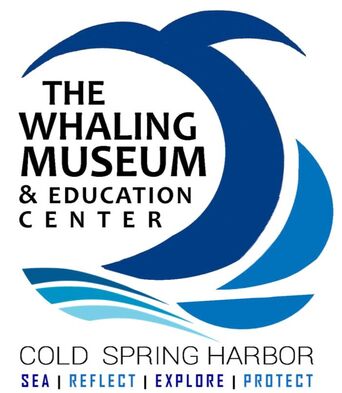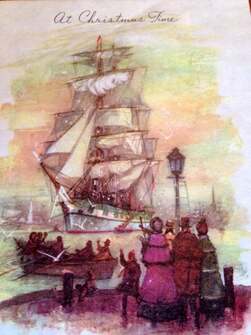 By Nomi Dayan If you showed a whaler a picture of a contemporary American family celebrating Christmas, he likely would have no idea what holiday he was looking at. Many of the familiar traditions we associate with Christmas today are relatively new. Christmas trees, a rosy-cheeked Santa Claus, and even the seasonal spirit of generosity only took hold in the mid-to-late 1800s. Yet as modern yuletide customs took shape during the Victorian era, Christmas was a different story for whalers at sea. The Captain decided if and how the day was observed. Eldred Fysh was one of the lucky whalers. He wrote aboard English ship Coronet in 1837: “This being Christmas day, there was no work done and the Capt. gave the men the means of making themselves as comfortable as they could do." William Morris Davis aboard the Chelsea (1834-36) of Connecticut was left disheartened. “I wish the world a merry Christmas, but there is no use in wishing a merry Christmas to that unfortunate race, generally known and vulgarly called Blubber Hunters. They have not wherewith to make a merry Christmas. This with us is plain Friday, only that occasionally someone bawls out, ‘I wish you a merry Christmas.’” 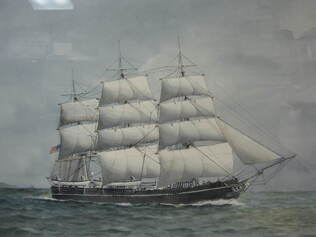 Whaleship Splendid Whaleship Splendid A more intimate view of Christmas at sea can be found in the diaries of whaling wives. Many remark celebrating Christmas with a special meal (a delight which may not have extended to the lower-ranked crew members). Eliza Edwards, who sailed from Honolulu on the Splendid of Cold Spring Harbor with her husband Eli, the first mate, wrote: “I don’t believe if you were home on Christmas and I at sea that you had any better dinner than I did. We had roast turkey just as tender and nice as it could be besides vegetables, oyster stew, and mince pie.” 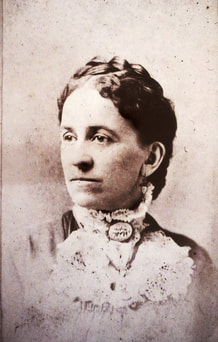 Annie Ricketson Annie Ricketson Annie Ricketson spent several years aboard the whaleship A. R. Tucker. She must have found herself quite bored on Christmas 1871, because all she wrote for that day was, “This is Christmas Morning. Last Christmas, Husband and I were home and we enjoyed ourselves very much.” The next year she found the day just as unremarkable: “Dec 25. The past two days have been very quiet, seen nothing.” The highlight of the day was wishing others Merry Christmas. “This morning before I was up the boy tip toed down the stairs and wished me a Merry Christmas...Mr. Bourne came and looked down the stairs and wished me. But I wished Mr. Harris and Mr. Vanderhoop. But the cook got a head of me. He looked down the sky light just as I sat down to breakfast and wished me. They all seemed very anxious to wish me first.” Nostalgically, she ends her entry, “I suppose they are having nice times at home now, wish I was there to enjoy it with them.” Christmas the following year was not much more exciting for Annie. “Nothing…worth writing about. But cannot pass Christmas by and not have something to write about. This morning I gave Daniel a present of a Cigar holder that I got him in St. Helena. He was very much pleased with it for he had been wanting one for a long time.” It was then back to work as usual: “Raised whales his forenoon – saw them jump out of water once, but it was so rugged saw nothing more of them. We thought we were going to have a nice Christmas present.” 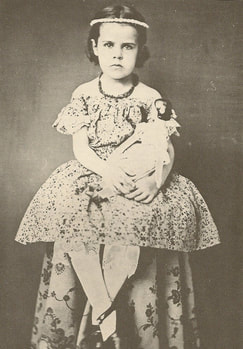 Ambrotype of Minnie Lawrence, Sandwich Islands, date unknown Ambrotype of Minnie Lawrence, Sandwich Islands, date unknown The captain’s children, if present, expected full stockings, even if at sea. When Clara Ryder on the N. D. Chase told her young son there was no chimney for Santa Claus aboard a ship, he thought “he should come down the stove pipe into the galley.” Mary Chipman Lawrence, who sailed with her young daughter Minnie on the whaler Addison, described four Christmases during her life at sea, each where she was careful to fill her daughter’s stocking:
Some whaling wives enjoyed making Christmas surprises for crew members. Mary Stickney on the whaler Cicero in 1881 journaled how she sent the Steward to get the cabin boy’s stockings and secretly fill them with “candy, peanuts, coconuts, and a calico shirt” she had sewed. One Christmas celebration at sea was planned a year in advance among three whaling families who agreed to meet at the tiny Norfolk Island east of Australia on December 25, 1856. And met they did, dining together on board one of the ships. Seventy five years later, three of those children shared the memory again in Nantucket – this time on dry land. Nomi Dayan is the Executive Director of The Whaling Museum & Education Center of Cold Spring Harbor. Upcoming December 2019 Events:
Details: cshwhalingmuseum.org/events
0 Comments
|
WhyFollow the Whaling Museum's ambition to stay current, and meaningful, and connected to contemporary interests. Categories
All
Archives
May 2024
AuthorWritten by staff, volunteers, and trustees of the Museum! |

 RSS Feed
RSS Feed
